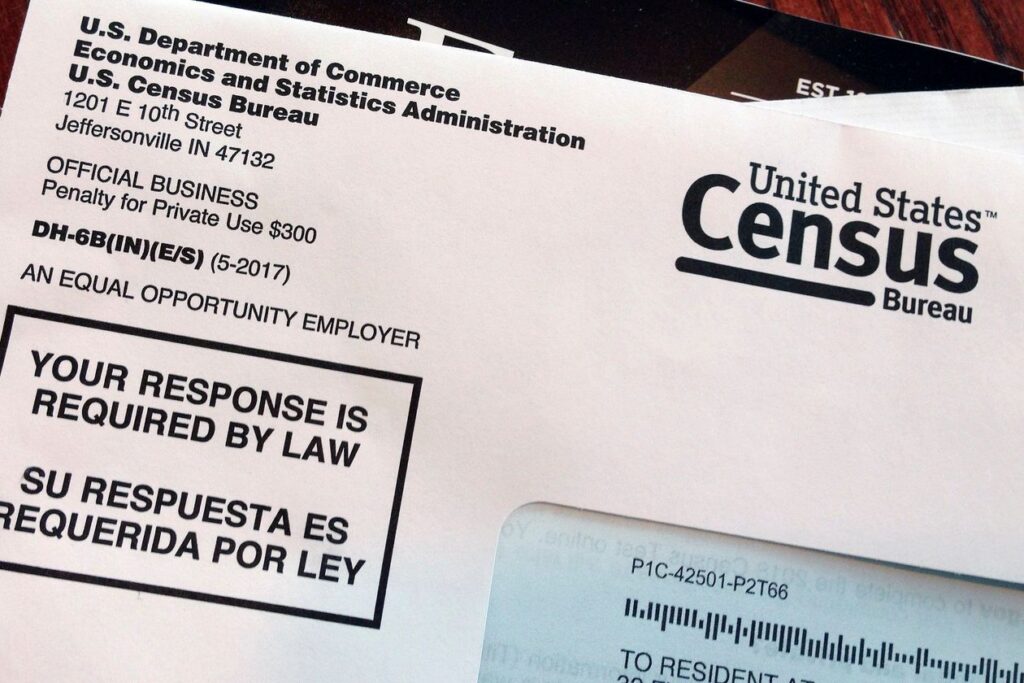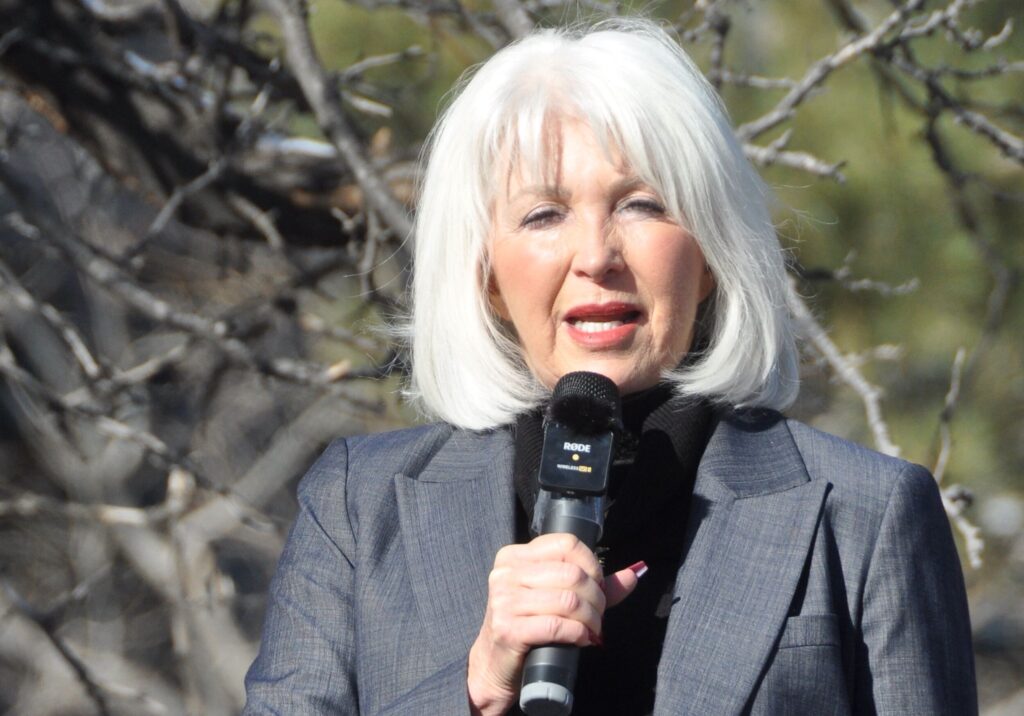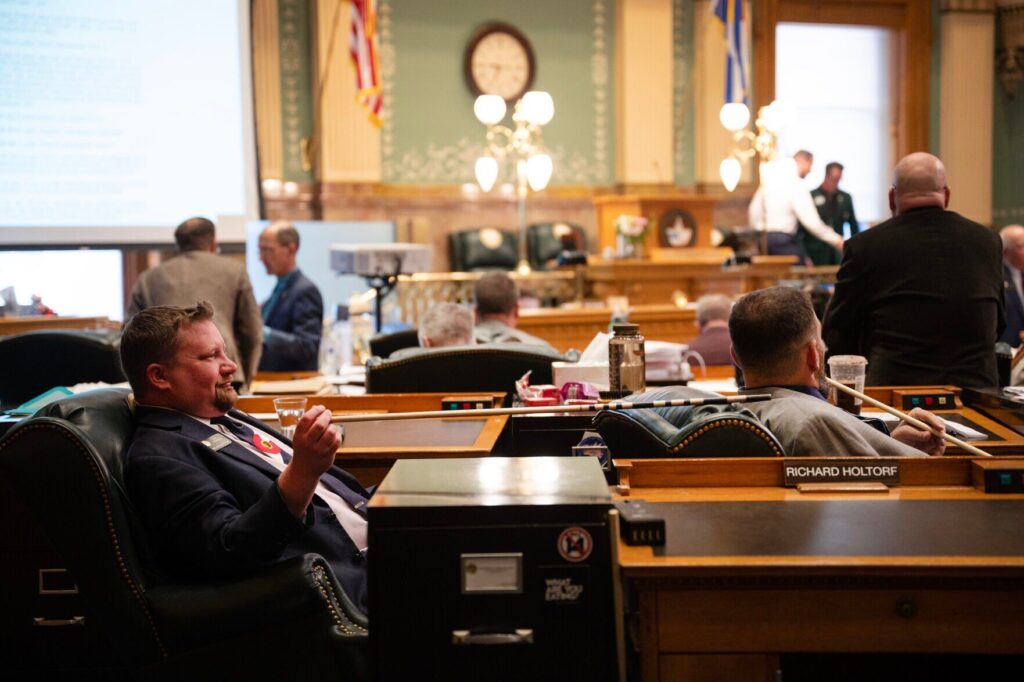As families recount stories of heartbreak, legislators mull contours of response to fentanyl crisis

There were few constants through Keith’s short life. His family – his parents Trisha and Jason Davidson, and sister Shaelynn – was one. His curiosity – constantly tinkering with electronics, fascination with space, admiration for Elon Musk – was another.
But so, too, was the failure of institutions that were in a position to help him as he struggled first with ADHD, Tourette’s syndrome and bipolar disorder, and later with substance use, his loved ones said.
Trisha and Shaelynn recounted those failures, which compounded over Keith’s short life, to lawmakers, who on Tuesday heard legislation they hope will confront Colorado’s spiraling fentanyl crisis.
Keith received little support in school. By the time he was 14, he was in and out of inpatient psychiatric facilities. Providers told Trisha and Jason that Keith needed intensive inpatient treatment. The family’s insurance wouldn’t cover it, and they didn’t have $60,000 needed for six months of care. Keith had frequent run ins with law enforcement, and in early 2021, he spent several weeks in the Weld County jail.
By then, Keith had been using fentanyl for a few months. He didn’t know what it was at first, Trisha and Shaelynn said. He was horrified when he found out later. Google searches on his phone, discovered later by his family, showed he looked for ways to get off of the drug.
Keith was given medications to help him detox in jail, but he was not placed on consistent medication treatment throughout his incarceration, his parents said. When he attempted to get treatment upon release, he was placed on a wait list. Like other people with substance-use disorders, who are at a far higher risk of overdosing once they’re released, Keith died on April 2, 2021 shortly after coming home.
He was 20.
“He wasn’t just a number and a statistic,” Shaelynn, 17, said of her brother. “He was someone with meaning.”
The Davidsons testified in support of House Bill 1326, which was reviewed Tuesday by the Senate Judiciary Committee. The family wants education, better treatment options and access in jails, as well as penalties and investigations for dealers. They don’t want any other family to experience what they have over the past year, they said.

The bill, which passed the House on Monday, is the legislature’s primary answer to the fentanyl crisis. It would tighten penalties for people convicted of distributing fentanyl, particularly when the drug use results in death; emphasize a key treatment option in jails and support people recently released from incarceration; and, fund a statewide education program. It would also set aside $20 million to buy more Naloxone and fentanyl test strips, among other provisions.
Just like a similar hearing in the House earlier this month, dozens of people testified on a bill that has gained significant attention since it was first introduced last month. The committee will consider amendments – which many of the speakers expressly advocated for – at a second hearing on Thursday.
Attempts to change the bill are a near-certainty: Sen. Brittany Pettersen, the bill’s co-sponsor, told the committee that she is working on an amendment related to medication-assisted treatment access in jail. Right now, the bill requires only that jails have “protocols” around MAT, as it’s known, but they don’t have to offer it. Attorney General Phil Weiser testified that he, too, supports requiring that jails offer MAT.
The Davidsons said MAT would’ve helped Keith.
But as has become the norm for this bill and the fentanyl debate broadly, much of the testimony revolved around the criminal penalties leveled at people who are caught possessing fentanyl. As written, the bill would make it a felony to possess more than 1 gram of fentanyl, and the individuals must also have known or should’ve known they possessed the substance, which is often mixed into other illicit drugs.
For harm reduction advocates, many of whom rallied outside the Capitol in advance of Tuesday’s meeting, the change is an unacceptable return to what they describe as the failed policies of the “War on Drugs.” For law enforcement, it’s not enough: As far as many district attorneys, sheriffs and police chiefs, possessing any amount of fentanyl should be a felony.
Josh Blum and Stephanie Stewart, physicians who work with people with substance-use disorders, said they have patients who regularly used 30 to 50 fentanyl pills daily, well over the 1 gram limit set in the bill and, in some cases, above the current felony threshold of 4 grams. The weight thresholds in the proposed legislation refer to the total weight of the drug – not the actual amount of fentanyl. Illicit pills often include relatively small but still potent amounts of fentanyl, while the bulk of the pills are made of a “filler” substance. This means 50 pills would weigh, in theory, 5 grams, but contain much less amounts of fentanyl.
Incarceration, fellow physician Sarah Rowan argued, “is bad for public health.”
“We’re in support of harm reduction,” Rowan said, when Sen. John Cooke, who’s co-sponsoring the bill with Pettersen, asked if they support any part of the measure. “We’re in support of more Naloxone. … We need much more treatment, as my colleagues have said. So, we are worried that the harms from more legal problems for our patients will outweigh the benefit of this bill.”

For law enforcement, fentanyl’s high potency makes it too dangerous to allow on the streets in any quantity.
“There is no safe amount of fentanyl to possess,” Greg Sader, the deputy chief of the Commerce City Police Department, told lawmakers after he recounted what many suspected was an accidental overdose deaths of five people who thought they were ingesting cocaine.
In addition to seeking a felony charge for any amount of fentanyl possession, Sader and other law enforcement officials advocated that the committee remove language saying that individuals must know or should’ve known the drug they possessed included fentanyl in order for the felony charge to kick in. The language addresses a key nuance: Fentanyl has permeated the drug supply, and many users of other substances, such as meth, cocaine, heroin or pills that look legitimate, don’t realize what they have.
But requiring they know or should’ve known would make prosecution impossible, district attorneys said. Michael Dougherty, the top prosecutor overseeing Boulder County, said that while the language has “good intentions,” it would make the law itself “unworkable,” short of a full confession.
Brian Mason, the district attorney for Adams and Broomfield counties, said including that language would essentially undo the changes to felony charges the bill would make.
But people wary of increased criminal penalties say making it a felony to possess fentanyl in any amount and in any substance risks incarcerating virtually anyone caught with a substance. Fentanyl is so prevalent within the drug supply that one provider told lawmakers earlier this month that he hasn’t seen a drug test that doesn’t include the substance in six years.
Sen. Pete Lee, a Colorado Springs Democrat who chairs the judiciary committee, said he, too, is concerned about people unwittingly possessing fentanyl.
“It’s the accidental user who was seeking something else,” he said, adding that he doesn’t want them to be “punished with the same draconian penalties that this is.”
Harm reduction and addiction specialists are less concerned with who should and shouldn’t be hit with a felony charge for possessing fentanyl. To those who testified, any additional criminal penalties would be a step backward. Lisa Raville, the executive director of the Harm Reduction Action Center in Denver, said incarceration has led the country to its current overdose crisis by driving drug use, with increasingly dangerous substances, underground.
Blum, Stewart and Rowan all advocated for increased treatment. They warned that felony convictions for users will only make their lives more difficult by denying them jobs and housing, which, they added, will make it harder for users to stay clean.
At the rally earlier that day, speakers described drug laws as being particularly impactful – often intentionally, they said – for communities of color. Denver Democrat Sen. Julie Gonzales, the committee’s vice-chair, pressed district attorneys on that point Tuesday. She asked what effect more felony charges will have on people of color in the coming three or four years.
Mason, the district attorney, agreed that there have been racial disparities in the criminal justice system. But he said he is committed to saving lives and that there is no way to know what would happen in the future.
For their part, the Davidsons focused on dealers. Users should get help, they told lawmakers. Keith never got the help he needed because of money, a barrier that shouldn’t exist for others. Users should get help, Trisha said, and if the person who gave Keith the pill that killed him was simply a user, that person should get help, too.
“I don’t know what the answer to possession is,” Trisha told lawmakers, her voice growing thicker from emotion. “But I just know that these people who my son got mixed up with took advantage of him. … They need to be held accountable.”
Trisha, Jason and Shaelynn testified Tuesday using an assumed last name out of concerns for their safety





























